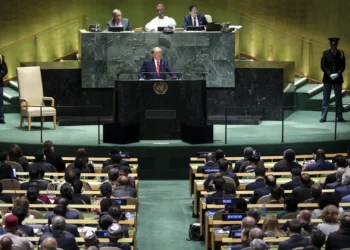In the Saturday WarRoom segment, Steve Bannon and Curt Mills delivered a scathing assessment of America’s overstretched and outdated military posture in the Middle East. Framed as a strategic liability rather than an asset, Bannon called the region’s footprint a relic of a post-WWII empire model that now functions more like a "Pentagon pawnshop”—offering up targets instead of deterrents. Their warning was blunt: U.S. bases littering the region no longer serve American interests, but rather act as bait in a region seething with geopolitical and ideological conflict.
The takeaway was clear: under Trump’s second term, the Middle East will no longer be a testing ground for empire. Instead, it will be judged by one criterion—does it serve American sovereignty, safety, and strength? If not, it’s time to shut it down.
Quick Clip:
"You Have To Send In Troops To Protect Troops.” Curt Mills On Israel And The War On Terror @CurtMills pic.twitter.com/JzJBtgMvZG
— Bannon’s WarRoom (@Bannons_WarRoom) June 28, 2025
Mills laid out three primary reasons for the bloated presence:
- (1) imperial inertia from World War II
- (2) safeguarding Israel as a permanent strategic pillar
- (3) the uncontrolled expansion following the post-9/11 surge.
Each factor, he argued, has become decoupled from reality. Bannon agreed, emphasizing that while the original logic may have had some justification in a Cold War framework, today it only guarantees American troops are easy targets in a powder keg.
The conversation pivoted to the recent Iranian escalations, which occurred during the short but intense "12-day war.” Both commentators pointed out that President Trump’s more measured and tactical approach to Iran—most notably the strike on Qasem Soleimani—was more effective than prolonged occupation or ambiguous deterrence strategies. The message? Swift, strategic action delivers results. Permanent military installations in hostile territory do not.
Bannon didn’t mince words about Israeli Prime Minister Benjamin Netanyahu’s motivations either.
"Bibi escalated this for political reasons,” Bannon said flatly, criticizing Netanyahu for triggering a broader regional reaction to prop up his domestic position.
Mills echoed the sentiment, suggesting Netanyahu may have miscalculated the American political climate and underestimated Trump’s current America First mandate.
Central to their critique was a demand to pivot U.S. strategic focus. Mills called for a "hemispheric defense posture”—a return to securing the U.S. homeland and Western Hemisphere rather than policing the Middle East. Bannon emphasized that these outdated deployments now serve the interests of foreign capitals and defense contractors, not the American people.
As the Supreme Court increasingly supports Trump’s authority to control administrative and military decisions, the commentators argued this provides a legal pathway to dismantle the current globalist entanglements. With war fever rising in D.C. and legacy media spinning narratives of retaliation and retribution, Bannon warned the next provocation could lead to unnecessary American casualties—unless the current architecture is dismantled.
This was not a call for isolationism, but for realism. Bannon and Mills see the moment as pivotal: abandon the failed promises of neocon and neoliberal war machines, or risk America’s sons and daughters paying the price for foreign entanglements that no longer serve U.S. interests.
For more context, watch this full WarRoom clip featuring Curt Mills:





